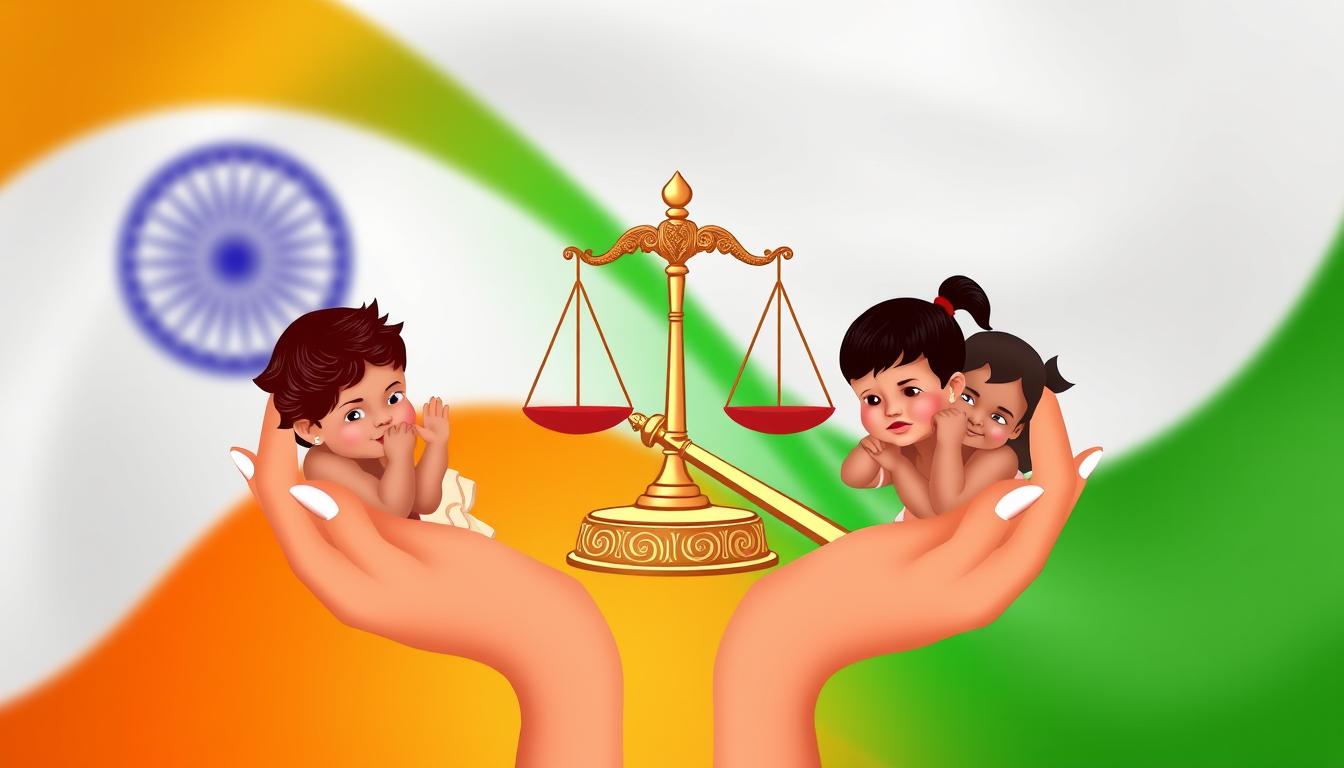The topic of age of consent in India is one of significant legal and cultural complexities. India’s framework for child protection laws has evolved considerably over the years, reflecting broader societal changes. At its core, these laws seek to safeguard minors from sexual exploitation while navigating the delicate balance of cultural norms and the varying maturity levels of adolescents.
India’s Protection of Children from Sexual Offences (POCSO) Act of 2012 is a monumental legislation aiming to prevent sexual abuse against minors. This Act stipulates an age of consent at 18 years. Notably, the judiciary, including figures like Chief Justice of India, D.Y. Chandrachud, has significantly influenced these laws through numerous landmark judgments.
Historical practices such as sati, child marriage, and the controversial evolution during the British colonial era, particularly with Behram Malabari’s advocacy efforts, have framed the contemporary discourse. The Age of Consent Act of 1891 was a pivotal point in India’s legal history, marking the beginning of legislative intervention in personal laws predominantly governed by custom and tradition.
Today, the legal landscape continues to adapt. The discrepancy between the age of consent and the legal age of marriage, persistent socio-cultural resistances, and ongoing legislative amendments, like the Prohibition of Child Marriage (Amendment) Bill, 2021, underscore the complexities at play. Understanding Indian legal system intricacies and the specific nuances of consent and minors is crucial for anyone interested in child protection laws in India.
Key Takeaways
- The Protection of Children from Sexual Offences (POCSO) Act sets the age of consent at 18 years.
- Historical influences such as the Age of Consent Act of 1891 have shaped modern legislation.
- There is a notable disparity between the legal age of consent and age of marriage in India.
- Recent amendments, like the Prohibition of Child Marriage (Amendment) Bill, reflect ongoing legal evolution.
- Judicial interpretations and landmark cases play a significant role in shaping Indian consent laws.
Understanding the Age of Consent Laws in India
The journey towards establishing coherent and robust age of consent laws in India has been long and complex. Rooted deeply in historical evolution and societal norms, these laws are influenced by both legislative measures and judicial interpretations.
Historical Evolution of Age of Consent Laws
The historical evolution of consent laws in India started with a mix of social customs and legislative efforts. Initially, child marriage was prevalent, with social reformers like Mr. Behram Balaji challenging these norms. Significant legislation like the Age of Consent Act, 1891, marked the beginning of formalizing the legal age for consensual activities.
Significance of the Protection of Children from Sexual Offences (POCSO) Act
The Protection of Children from Sexual Offences (POCSO) Act, 2012, brought significant changes in how minors are protected under the law. Recognizing the need for stringent measures, POCSO defined a comprehensive approach towards protecting children under 18 from sexual offenses. The Indian legal system has been actively working to ensure that POCSO is effectively implemented to safeguard minors.
The Role of Judiciary in Shaping Consent Laws
The judiciary has played an integral role in shaping the age of consent laws in India. Landmark judgments like those from Chief Justice D.Y. Chandrachud emphasize the need to continually revisit and refine POCSO provisions. Cases like Suresh v. State of UP and Himmat Sukhadeo v. State of Maharashtra underline the judiciary’s commitment to protecting children while balancing the nuances of the Indian legal system.
| Year | Legislation/Judgment | Significance |
|---|---|---|
| 1891 | Age of Consent Act | First formal legislation setting the age of consent |
| 2012 | POCSO Act | Comprehensive definition of sexual assault against minors |
| 2013 | Criminal Law Amendment (CLA) Act | Expanded definition of rape |
Current Legal Framework and Recent Amendments
India’s legal framework on the age of consent and marriage has undergone significant changes over the years. The current legal framework is heavily influenced by the Protection of Children from Sexual Offences (POCSO) Act, 2012, which raised the age of consent to 18 years. This complex landscape requires a closer examination to understand the interplay between consent laws and marriage regulations.

Age of Consent and Legal Age of Marriage
The legal age of consent in India, set at 18 years by the POCSO Act, intersects significantly with the legal age of marriage. Despite the age of consent being raised, there are still complexities given that the legal age of marriage remains 18 for women and 21 for men. The contrast between age of consent and age of marriage raises questions about individual autonomy and protection against child marriage.
Studies revealed that between 18% to 30% of rape cases decided between 2013 and 2016 involved consensual relationships, highlighting the dichotomy faced under the current legal framework. Additionally, 54% of sexual assault cases in Lucknow were consensual, reflecting societal challenges in distinguishing between consensual and non-consensual acts.
The Prohibition of Child Marriage (Amendment) Bill, 2021
The Prohibition of Child Marriage (Amendment) Bill, 2021, is a step toward better regulatory alignment. The Bill aims to increase the legal age of marriage for women to 21, aligning it with that of men. This proposed amendment seeks to eliminate gender-based disparities and provide a uniform standard for marriage across genders. The amendments also focus on stricter enforcement mechanisms and penalties for violations, ensuring better protection of minors.
Under the current system, undertrials in POCSO cases often come from marginalized communities, facing biases that complicate their fight for justice. Implementing the amendments could present more balanced judicial discretion, especially for juveniles between the ages of 16 and 18, where the prosecution is strict under the POCSO Act.
Comparison with International Perspectives
Analyzing India’s stance on the legal age of consent and marriage through an international lens brings to light varied practices and norms. Globally, the age of consent varies significantly, shaped by cultural and legal factors. For example, in many Asian countries, the age of consent ranges widely, with no uniform standard across the continent. India’s current legal framework is neither the most stringent nor the most lenient, putting it in a middle ground position.
The age of consent laws, driven by the POCSO Act, reflect India’s commitment to protecting minors, yet the strict nature of these laws often leads to challenges in consensual cases, as echoed by judicial concerns in the Karnataka and Madhya Pradesh High Courts. Amendments that introduce judicial discretion could bring India’s consent laws in closer alignment with international perspectives, fostering a more equitable legal environment for minors.
The ongoing amendments, societal attitudes, and judicial interpretations emphasize the need for a balanced approach that protects minors while considering their autonomy and rights. The proposed changes highlight a progressive shift towards addressing these nuances within India’s current legal framework.
Enforcement of Consent Laws in India
The enforcement of consent laws in India remains a deeply intricate and evolving challenge. The journey to uphold these laws is laden with a multitude of obstacles that reflect the complexities within the country’s legal framework.

Challenges in Law Enforcement
Law enforcement agencies in India grapple with significant hurdles while implementing the enforcement of consent laws. Issues such as lack of awareness, socio-cultural resistance, and limited resources contribute to these challenges. The decentralized nature of India’s legal enforcement exacerbates these difficulties, creating inconsistencies in the application and interpretation of the laws.
Significant Case Studies and Judicial Interpretations
Critical case studies illuminate the judicial interpretations pivotal to the enforcement of consent laws. For example, landmark judgments in Suresh v. the State of Uttar Pradesh and Himmat Sukhadeo v. State of Maharashtra underscore how courts interpret age of consent in criminal proceedings. These cases showcase the importance of caution when considering child testimony under the Indian Evidence Act. Additionally, instances like M.P. v. Ramesh highlight the necessity for corroboration, ensuring a fair trial process.
Role of Law Enforcement Agencies and NGOs
The role of law enforcement agencies and NGOs is indispensable in the effective enforcement of consent laws. These organizations are pivotal in raising awareness, reporting violations, and advocating for minors’ rights. Their collaborative efforts work towards bridging gaps between the judicial interpretations and the practical enforcement of the laws, ensuring a more cohesive framework for protecting minors.
| Country | Age of Consent |
|---|---|
| India | 18 |
| USA | 18 (varies by state) |
| South Africa | 16 |
| China | 14 |
| Cambodia | 15 |
| Afghanistan | Puberty |
| Brunei | 16 |
| Armenia | 16 |
| Bhutan | 16 |
Social and Cultural Implications of Age of Consent Laws
The age of consent laws in India are deeply rooted in cultural attitudes towards consent and societal norms. The Law Commission of India’s recommendation to reduce the age of consent from 18 to 16 under the Protection of Children from Sexual Offences (POCSO) Act highlights the ongoing debate about aligning legislative frameworks with the realities of adolescent sexuality.
Cultural Attitudes and Societal Norms
India’s age of consent being set at 18 years is notably higher than the global average of 16, as stated by the United Nations. European countries typically have a lower age of sexual consent (around 14-16), and in North America, it ranges from 16 to 18. This disparity underscores the unique cultural attitudes towards consent within Indian society. Historical events like the Age of Consent Act of 1891 reflect India’s complex relationship with these laws, often influenced by resistance from various societal factions.
Impact on Minors and Their Legal Rights
The implications of age of consent laws have a profound effect on minors and their legal rights. The Chief Justice of India and several State High Courts have raised concerns about criminalizing consensual sexual activity among adolescents under POCSO. As it stands, India’s legislation often positions young individuals as offenders rather than recognizing the maturity and autonomy of adolescents. Advocates for lowering the age of consent argue that it would reduce criminalization and better align with youths’ biological maturity and global standards.
Case Studies Highlighting Social Issues
Real-world case studies reveal the social issues surrounding consent laws in India. Legislative changes in 2012 raised the age of consent from 16 to 18 years, further complicating the situation for adolescents exploring their sexuality. Despite the intent of these laws to protect minors, they have unintentionally fortified regressive social norms and increased family control over adolescents’ sexual choices. Additionally, the barriers to reproductive and sexual health care for adolescents have become more pronounced. Cases in India and Nepal show that parents sometimes use these laws to control or dissolve relationships, especially in disapproved marriages such as inter-caste or inter-religion unions.
Conclusion
Reflecting on the age of consent in India, the journey through its legal landscape unveils profound insights into both the nation’s evolving legal systems and the societal changes they aim to capture. From the rejection of proposals to lower the consent age to 15 in 2013 by the Prime Minister, to ongoing amendments under the Protection of Children from Sexual Offences (POCSO) Act, India’s legislative endeavors encapsulate its broader efforts to balance child protection with evolving societal norms.
The examination of these issues reveals a dynamic interplay between historical context and contemporary legal frameworks. Significant milestones, such as the criminal law amendments in Uttar Pradesh prohibiting anticipatory bail for rape accused, juxtaposed with landmark judgments like the Delhi High Court’s stance that the POCSO Act should not criminalize consensual relationships between young adults, underscore the complexity and depth of this legislative journey. Evaluating these legal systems and societal change highlights both progress and the perpetual challenges that lie ahead.
As India continues to grapple with the intricate dimensions of safeguarding minors while respecting individual autonomy, it’s apparent that the legal system must evolve in tandem with societal shifts. NGOs, law enforcement agencies, and the judiciary play pivotal roles in this evolving narrative, striving for an equitable framework that genuinely reflects the nuanced realities of adolescent experiences. This comprehensive reflection on the age of consent in India emphasizes the importance of a balanced approach that champions both protection and personal freedoms for its youth.
FAQ
What is the current age of consent in India?
The current age of consent in India is 18 years, as outlined in the Protection of Children from Sexual Offences (POCSO) Act.
How have age of consent laws evolved over time in India?
Age of consent laws in India have significantly evolved, beginning with the Age of Consent Act of 1891 that was influenced by social reformers like Behram Malabari. The current laws are more comprehensive, addressing various social factors and protecting children from sexual offenses.
What is the POCSO Act and why is it significant?
The Protection of Children from Sexual Offences (POCSO) Act, enacted in 2012, is a landmark law designed to protect minors from sexual abuse and exploitation. It has brought the issue of age of consent to national prominence and aims to safeguard children’s rights comprehensively.
How does the judiciary influence age of consent laws in India?
The judiciary plays a crucial role in shaping age of consent laws through landmark judgements and active advocacy. Figures like Chief Justice D.Y. Chandrachud have been significant in pushing for the refinement and effective implementation of these laws.
Is there a difference between the age of consent and the legal age of marriage in India?
Yes, there is a difference. While the age of consent is 18 years, the legal age of marriage for women is also 18, but for men, it is 21. This discrepancy has been a topic of legal debate and reform attempts like the Prohibition of Child Marriage (Amendment) Bill, 2021.
What are the challenges in enforcing consent laws in India?
Enforcement of consent laws in India faces numerous challenges including social resistance, lack of awareness, and discrepancies within the legal system. Case studies like Suresh v. the State of UP highlight complex judicial interpretations and difficulties in law enforcement.
How do cultural attitudes affect the implementation of age of consent laws?
Cultural attitudes play a significant role in the implementation of age of consent laws. Historical resistance to raising the age of consent reveals deep-rooted societal norms and practices that often contradict legislative efforts.
What impact do these laws have on minors and their legal rights?
Age of consent laws are designed to protect minors from sexual exploitation while also navigating the fine line of not criminalizing consensual acts among adolescents. These laws significantly impact the legal rights and social status of minors in India.
Can you provide examples of significant cases that impacted these laws?
Significant cases like Suresh v. the State of UP and Himmat Sukhadeo v. State of Maharashtra have impacted the interpretation and enforcement of age of consent laws. These judgements delve into how child testimony is considered and the nuances of legal proceedings involving minors.
How do NGOs contribute to the enforcement of consent laws?
NGOs play a vital role by raising awareness, reporting violations, and advocating for the rights of minors. They work alongside law enforcement agencies to ensure proper implementation and highlight issues related to age of consent.
What are the social issues surrounding the age of consent laws in India?
Social issues surrounding age of consent laws in India include balancing protection with the criminalization of consensual adolescent relationships, cultural resistance to legal change, and the broader implications on minors’ rights and societal norms. Case studies illuminate these complex dynamics.
Source Links
- https://www.shankariasparliament.com/current-affairs/age-of-consent-in-pocso-act
- https://www.termsfeed.com/blog/age-consent-privacy-laws/
- https://en.wikipedia.org/wiki/Age_of_consent_reform
- https://blog.ipleaders.in/age-of-consent-in-india/
- https://www.ncbi.nlm.nih.gov/pmc/articles/PMC8009025/
- http://pure.jgu.edu.in/7479/1/THE AGE OF CONSENT IN INDIA_ UNDERSTANDING POCSO AND THE INTERPRETATION BY THE COURTS.pdf
- https://ijme.in/articles/law-commission-of-india-report-on-the-age-of-consent-denying-justice-and-autonomy-to-adolescents/?galley=html
- https://www.scconline.com/blog/post/2023/09/30/law-commission-recommends-to-amend-pocso-act-legal-news/
- https://www.ndtv.com/india-news/10-years-to-18-the-history-of-age-of-consent-in-india-4436742
- https://en.wikipedia.org/wiki/Ages_of_consent_in_Asia
- https://www.linkedin.com/pulse/criminalization-consensual-relationships-india-need-k-jaishankar
- https://pubmed.ncbi.nlm.nih.gov/33470187/
- https://www.girlsnotbrides.org/documents/2109/Learning_series_Law_Notes.pdf
- https://www.ncbi.nlm.nih.gov/pmc/articles/PMC6436061/
- https://www.civilsdaily.com/news/reviewing-the-age-of-consent-under-pocso-act/

